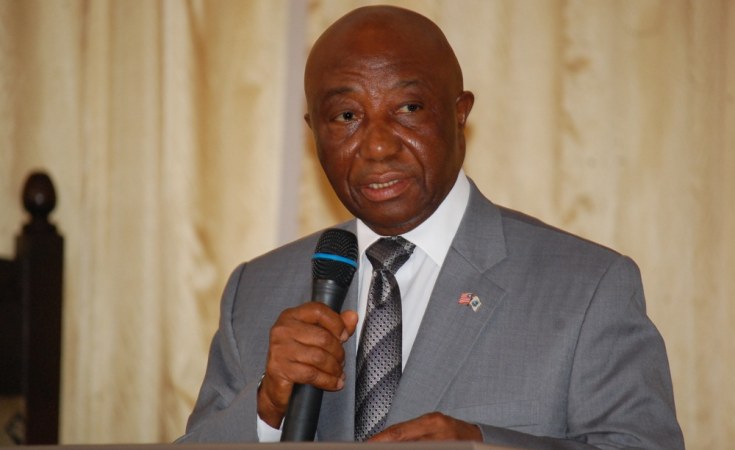Monrovia — President Joseph Nyuma Boakai's victory over his political rival, then-incumbent President George Manneh Weah, in the 2023 Presidential Elections, was hard-won and the result of collective efforts. It required the collaboration of his party, allies, and key individuals who sacrificed their time, effort, resources, and expertise to turn the tide in favor of the Unity Party Alliance, reviving the political career of then-candidate Boakai.
However, less than a year into his administration, President Boakai faces mounting criticism from key allies, raising concerns about his leadership and policy direction. Prominent voices have expressed dissatisfaction, accusing the administration of faltering on critical issues.
John Morlu, former Auditor General of Liberia and a lead campaign fundraiser for the Boakai campaign, was instrumental in mobilizing financial support, particularly from the diaspora. He also served on the Boakai-Koung transition team. However, after the inauguration of President Boakai and Vice President Jeremiah Koung in January, Morlu departed for the United States, feeling sidelined despite being considered a strong candidate for a top cabinet post.
"I am a man who believes in professionalism, organization, structure, and clear terms of reference," Morlu said. "They made a mockery of me. But I firmly believe that the fundamental issue in Liberia is not about the number of kilometers of roads built or the number of chairs in schools. Those are government responsibilities. The core problems that have afflicted every president are governance, accountability, and transparency."
Morlu highlighted accountability as a major challenge for the Boakai administration, emphasizing that quick actions without proper organization could undermine progress. "During the transition, I insisted on structure, process, and organization. From what I observed, accountability was going to be a challenge for this government because they wanted to act quickly without proper organization," he explained.
He also criticized the dismissal of civil servants affiliated with the opposition Coalition for Democratic Change (CDC), describing it as poor governance. "The dismissal of CDCians represents poor governance and a disregard for the interests of Liberians. It's time for Boakai to wake up and show true leadership. This situation demands courage, and we encourage everyone to stand up for their fellow Liberians," he said.
"We must stand up against bad practices, whether they come from Uncle Joe Boakai, [George] Weah, [Ellen Johnson] Sirleaf, [Charles Gyude] Bryant, [Charles] Taylor, [Samuel Kanyon] Doe, [William] Tolbert, or [William] Tubman," Morlu declared. "Liberia is hurting and not at peace, with zero opportunities for jobs for ordinary folks. So far, we see no rescue, only a replacement game."
Gbarpolu County Senator Amara Konneh also raised alarms about the administration's handling of pressing issues, particularly the economy. "We need urgent action on the economy, which is sending mixed signals: the exchange rate is improving, but prices are stagnant or rising, joblessness is increasing, electricity is still scarce, businesses are struggling, and optimism is dwindling," he noted in a recent Facebook post. Senator Konneh further emphasized the need for investment in the Liberia Drug Enforcement Agency (LDEA) to combat the growing illicit drug crisis. "Our failure to address and invest in the LDEA this year is a missed opportunity that endangers our youth and the country's future. Leaders must prioritize this critical issue."
Konneh also highlighted the importance of collaboration between the Executive and Legislative branches, urging President Boakai to unite the government following recent Supreme Court rulings in the House's impasse. "President Boakai's success in the Executive Branch depends on a well-functioning Legislature. He must unite us now, following the Supreme Court's opinion, to make 2025 a better year for our country," he said.
Cllr. Tiawan Gongloe, a renowned legal practitioner and former presidential candidate on the ticket of the Liberia People Party (LPP), also voiced strong criticism of the Boakai administration. While acknowledging some accomplishments, Gongloe expressed concern over what he described as "glaring shortcomings" in Boakai's leadership.
Gongloe praised efforts such as implementing recommendations of the Truth and Reconciliation Commission, establishing the office of the War and Economic Crimes Court, and increasing female representation on the Supreme Court bench. However, he criticized the administration for failing to uphold the rule of law, citing illegal dismissals of government employees for criticizing the President on social media. He argued that this violated freedom of speech and undermined the inclusivity mandated by the Executive Law of 1973.
Gongloe also expressed disappointment in the government's approach to combating corruption and its handling of public protests. He condemned the deployment of the military during a peaceful gathering at the airport to welcome former President George Weah, calling it a dangerous precedent. Additionally, he criticized Boakai's failure to engage with Weah, describing it as a missed opportunity for national unity.
Adding to the chorus of dissent, Stanton Witherspoon, CEO of Spoon Network, lambasted the administration for alleged missteps, including the "Yellow Machine" saga and questionable payments involving the Ministry of Commerce. Speaking on his widely followed Spoon Talk, Witherspoon described these as some of the worst actions under the Boakai-Koung administration.
"The 'Yellow Machine' was the number one corrupt attempt by folks close to the president without the president taking no action," he said, alleging that the scheme involved $84 million under the management of individuals close to Boakai. "This was one of the worst [actions] in the history of our country," he added, further claiming that Vice President Koung was called upon to salvage the situation.
The growing dissent among President Boakai's allies underscores mounting challenges within his administration. The criticisms highlight concerns over governance, economic management, and the fight against corruption. As 2025 approaches, calls for decisive action and inclusive leadership are intensifying.
The Executive Mansion did not respond to FPA up to the end of production.


